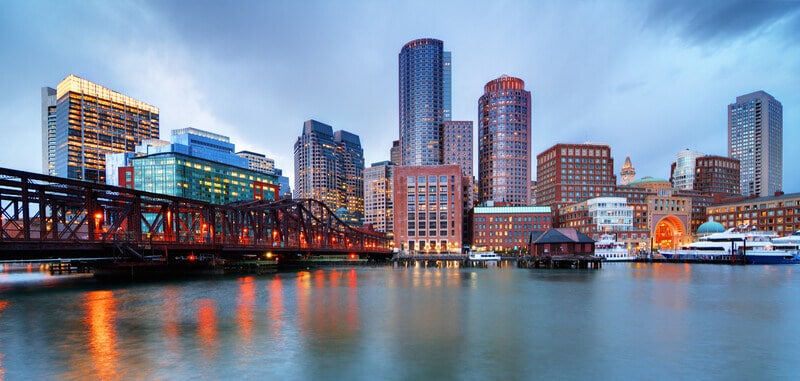This article is written to help families moving to Boston save with affordable movers from Pricing Van Lines.
We make moving to Boston simple and this guide will give you the basic steps and break it down so you will know where to start.
We also give you in-depth tips about areas in Boston and moving pricing.
Moving To Boston Is Fun
Moving to Boston is such a great choice in life. With a little preparation, you can navigate the move and life transition like a total pro. Here is our Pricing Van Lines guide to moving to Boston.
1. First and most importantly, familiarize yourself with the city’s diverse neighborhoods, each offering its unique charm and vibes.
From the historic streets of Beacon Hill to the upbeat atmosphere of Allston, you need to know the differences to make educated choices.
Understanding where you want to live can significantly enhance your experience of moving, feeling like you know where you are going.
Pro tip- take a pre-move weekend to spend time in each different area. You can rent an Airbnb and really feel like a local to understand the true feel of each area and the amenities you will find there.
2. Next, let’s talk about and plan the logistics of your move. Boston’s housing market is competitive for both renting and buying, so starting your search early is my top tip. Check local listings to get a sense of what’s available and pricing differences between areas.
If possible, visit neighborhoods in person to get a feel for them. Be prepared for high rents, particularly in popular areas; budgeting accordingly will help ease the financial stress.
3. Once you’ve locked down a place to live, let’s talk about transportation options. If you aren’t coming with your personal car, get familiar with the city’s public transportation system, known as the “T.”
It’s a pretty reliable way to navigate Boston and can help you avoid the hassle of parking in a city known for its narrow streets. It can be difficult to transition from having a car to being reliant on public transit.
4. Explore the city’s rich history and vibrant culture when you arrive. Visit the Freedom Trail, Fenway Park, and the Boston Common, and take advantage of local museums, theaters, and music joints with the entire family.
Boston is a great tourist attraction for the entire family. You will find lots of local festivals and events around the city.
5. Embrace the local customs. Bostonians are known for their pride in their city, so show respect for its history and people and most importantly for the Red Sox.
Boston Moving Prices
Moving locally within Boston will cost you anything from around $600 for the labor and short drive to $2500 if you are moving a huge home with many delicate pieces.
If you are moving from another state, you will have other charges added, but anything is possible. If you want to save, consider customizing your move and using more DIY options.
If you are able to assemble and disassemble your own furniture, you will save hundreds. Pay for just the hauling and save, but don’t do this at the expense of your back health.
Boston Moving Tips
Moving can be a big task, but with the right planning and organization, you can do it!
1. Create a Personalized Moving Checklist: This lines out the tasks you need to accomplish before, during, and after the move. This will help you stay organized and on track.
2. Declutter: Before packing, go through your things and decide what to keep, donate, or discard. This will help you save.
3. Packing Supplies: Collect boxes, bubble wrap, packing tape, and markers ahead of time. Use existing bags and suitcases for clothes and linens to save on boxes.
4. Label Boxes: Clearly label every box with its contents and the room it belongs to.
5. Pack Essentials Separately: This is a must. Create a box or bag for essentials you’ll need right away—like toiletries, a change of clothes, important documents.
6. Hire Professionals: If your budget allows, consider hiring professional long distance movers ahead of the moving date to save.
7. New Address: Update your address with the post office, banks, and other services.
8. Explore Your New Neighborhood: Once you’ve moved in, take some time to explore your new area. Start enjoying Boston!
Boston’s Top Eats Local Style
I don’t know about you, but for me when it comes to moving to a new city, my favorite thing to do is understand the foodie scene. Boston has a wonderful dining scene, it has a range of foods and spots to satisfy any foodie. Here are some top restaurants that I personally love:
1. Oleana
Located in Cambridge, this Mediterranean perfect resto has specially spiced dishes and a great outdoor dining area. The chef’s approach to Middle Eastern flavors is a standout. If you love healthy Mediterranean foods this is the spot for you.
2. Mamma Maria
Located at the North End, this Italian restaurant gives a homey atmosphere for the whole family and a menu full of homemade pasta and all the best Italian specialties like the pepperoni pizza.
3. Myers + Chang
This fun, Asian-inspired spot in the South End is known for its small yet delicious plates, unique cocktails, and crazy decor, making it perfect for sharing or for a date night.
4. Yvonne’s
A lively spot, Yvonne’s manages to mix fine dining with a relaxed atmosphere and laid back. The menu has a mix of American dishes and classic cocktails. It is great for a classy night out.
5. The Capital Grille
Known around the East for its dry-aged steaks and impressive wine pairing list, this upscale steakhouse offers a high class dining experience in the Back Bay.
6. Legal Sea Foods
If you love crabs, this is the spot for you. A Boston favorite, this restaurant offers fresh seafood and a casual vibe. Don’t miss the clam chowder, a local favorite! Fresh is the name of the game at Legal.
7. Flour Bakery
This bakery and café is a perfect spot for family brunch or a sweet bite. Their pastries and sandwiches are the local favorites.
Wrapping Up the Boxes To Boston
By staying organized and planning ahead, you can make your move a more enjoyable experience! With our top restaurant tips you have enough starter info to at least get your belly excited. We hope this guide will help you budget and plan out your Boston move like a pro. Read through out moving tips to save and enjoy your journey to Boston.
Frequently Asked Questions
How can I make a lofty moving goal realistic and attainable?
Every time you finish packing up another box or room, take a moment to celebrate your accomplishments. Acknowledging the small milestones helps you reach the bigger ones.
This will keep you motivated and boost family morale. Finishing up packing a room and cleaning it out is a bigger task than usual. Reward yourself and your family.
Why should I create a personal inventory list of my home items?
Your personal inventory home list will help you settle on a binding quote with an actual number and a tally as well as be your own personal insurance policy if anything were to happen to your goods.
This list which should include pictures of all the items is your proof if your TV shows up at the new home with a giant crack that it was the moving company’s fault.
How can I know that I can trust iMoving’s recommendations of movers?
You don’t have to take our word for it as we are clearly biased. Trust the thousands of happy customers we have helped move over the last 30 years. You can read their reviews of our marketplace and we can even set up a call for you with a former client if you want to hear it from them directly.
All the moving companies on our marketplace are vetted by our talented team who check their accident records, DOT registration, former claims against them, and their overall performance.
We even go as far as using secret shopping techniques to check in on their customer service manners and ensure our clients are getting the respect and service they deserve!
How do I start creating my own moving inventory list?
Pick up a pen and paper (or your iPhone) and begin. Start with the big items and work your way through to the small household items in every room. Keep a tally and write everything down along with photo evidence. Count the number of beds, bed frames, TVs, and so on so that you can hold your mover accountable and know what you have to work with.
What is the best way to keep my favorite items safe?
The truly special pieces I would recommend actually packing up in many layers of bubble wrap and towels and actually putting them in your personal car if the option exists. You can of course wrap these items and put them in a plastic bin with many layers of pillows, towels, and more soft items and write “fragile” on top, but I think it’s better to play it safe than sorry.




